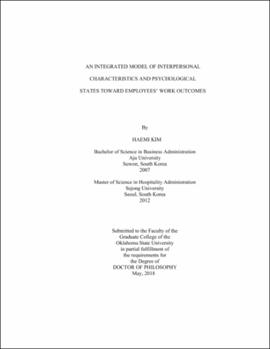| dc.contributor.advisor | Qu, Hailin | |
| dc.contributor.author | Kim, Haemi | |
| dc.date.accessioned | 2023-04-26T16:20:22Z | |
| dc.date.available | 2023-04-26T16:20:22Z | |
| dc.date.issued | 2018-05 | |
| dc.identifier.uri | https://hdl.handle.net/11244/337467 | |
| dc.description.abstract | The purpose of this study is to build and empirically test a model describing the psychological mechanisms underlying employees’ social exchange relationships in the workplace by applying both the interpersonal characteristics of work design and the job characteristics model (JCM). This study specifically aims to extend the JCM by investigating not only the effects of interpersonal relationships with customers, supervisors, and coworkers on psychological states (customer orientation and organization-based self-esteem) but also the moderating effects of situational strength between psychological states and job satisfaction. A cross-sectional questionnaire survey was conducted by targeting frontline employees who were working in the full-service restaurant segment in the United States at the time of the survey. A total of 499 responses were analyzed using a confirmatory factor analysis, structural equation modeling, and hierarchical multiple regression analysis. | |
| dc.description.abstract | The results presented that all path relations among constructs that were hypothesized were empirically supported. It suggested that the interpersonal characteristics of work design acted as critical aspects of work to increase employees’ psychological states, eventually triggering positive work attitudes and prosocial behaviors. Moreover, it showed that role clarity and role consistency were fundamental situational factors to moderate the relationship between psychological states and job satisfaction in the hospitality industry. This study extended the JCM by incorporating the interpersonal characteristics of work design as new core dimensions of work. More importantly, it presented that the customer-employee exchange at the service encounter was the most influential interpersonal relationship to trigger positive psychological states from employees. In addition, the study contributed to the JCM by presenting that the interaction of situational and individual factors showed a better understanding and prediction of employees’ work attitudes. Lastly, this study gave rise to a new theoretical perspective that is distinct from other existing frameworks by not only taking the social dimensions of work as the core characteristics but also focusing on outcomes related to social components. | |
| dc.format | application/pdf | |
| dc.language | en_US | |
| dc.rights | Copyright is held by the author who has granted the Oklahoma State University Library the non-exclusive right to share this material in its institutional repository. Contact Digital Library Services at lib-dls@okstate.edu or 405-744-9161 for the permission policy on the use, reproduction or distribution of this material. | |
| dc.title | Integrated model of interpersonal characteristics and psychological states toward employees' work outcomes | |
| dc.contributor.committeeMember | Qu, Hailin | |
| dc.contributor.committeeMember | Slevitch, Lisa | |
| dc.contributor.committeeMember | Leong, Jerrold K. | |
| dc.contributor.committeeMember | Wang, Cynthia | |
| osu.filename | Kim_okstate_0664D_15622.pdf | |
| osu.accesstype | Open Access | |
| dc.type.genre | Dissertation | |
| dc.type.material | Text | |
| dc.subject.keywords | interpersonal characteristisc of work design | |
| dc.subject.keywords | prosocial behavior | |
| dc.subject.keywords | psychological states | |
| dc.subject.keywords | situational strength | |
| dc.subject.keywords | social exchange | |
| dc.subject.keywords | work attitude | |
| thesis.degree.discipline | Human Sciences | |
| thesis.degree.grantor | Oklahoma State University | |
